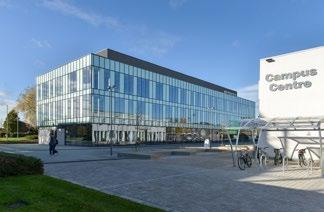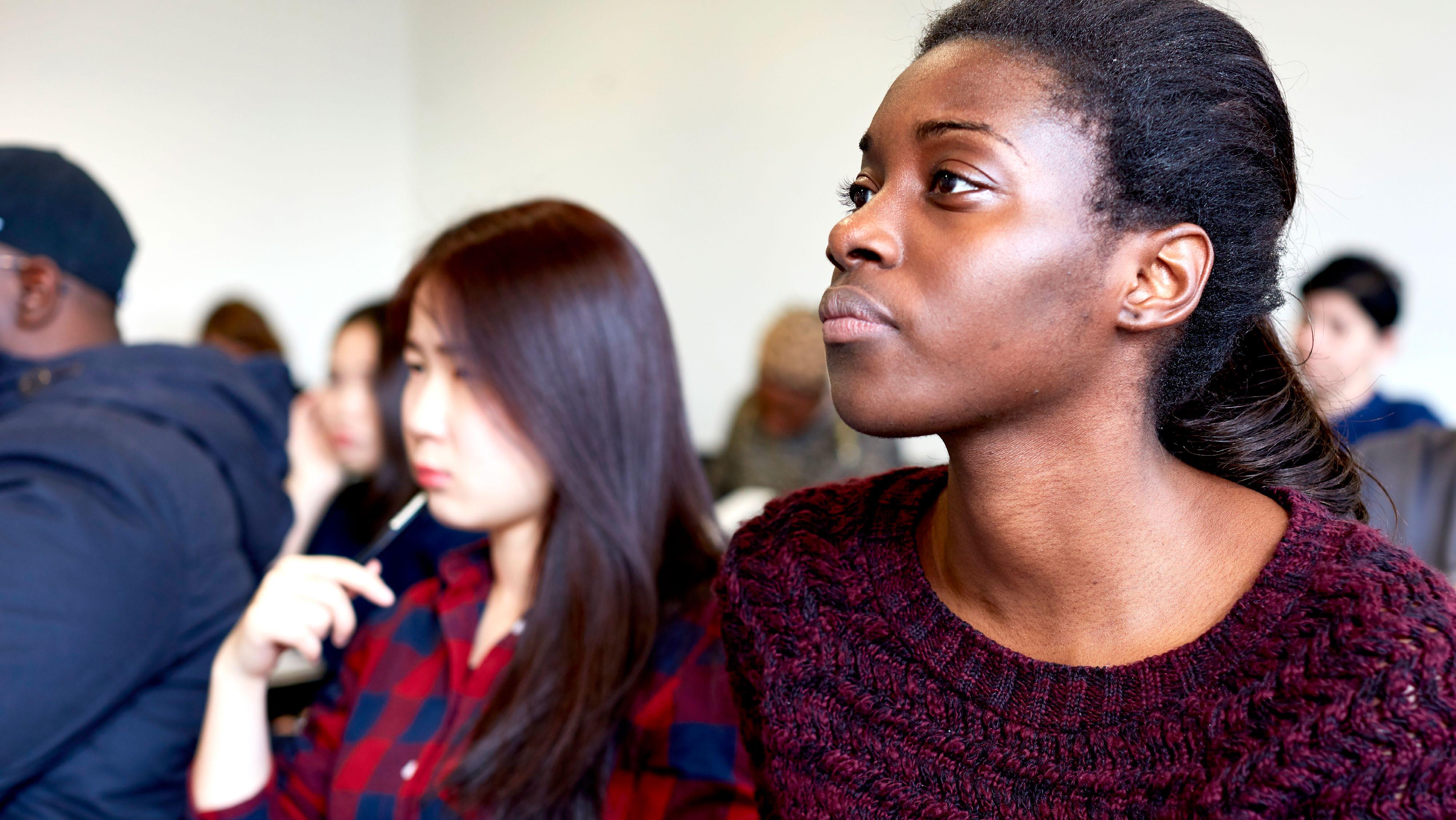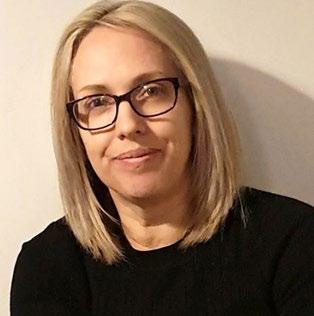STUDYING CRIMINOLOGY AND SOCIOLOGY
AT THE UNIVERSITY OF BEDFORDSHIRE
Faculty of Health & Social Sciences
School of Applied Social Sciences




Begin@Beds


2 CONTENTS Welcome to Criminology and Sociology 3 What to expect in induction week 4 What you will be studying in your first year 5 Assessment 6 Preparation for your first week 7 Indicative Teaching timetable 8 Frequently asked questions 9 Final Thoughts 10
The staff of Applied Social Sciences welcome you to your BSc Criminology and Sociology degree course at the University of Bedfordshire; we are delighted that you will be studying us. This booklet provides useful information that will prepare you for your course and your first few weeks and months at university.
Dr Fiona Factor Head of School

WELCOME CRIMINOLOGY AND SOCIOLOGY AT

Hello, my name is Deborah Spring, and I am the course coordinator for the BSc Criminology and Sociology degree course. This course aims to provide you with opportunities to understand, challenge and interpret events and contemporary issues in society. It is a degree you need if you want to understand the world we live in, how it is organised, how it has changed and is changing.
We have designed your curriculum with the aim of maximising your knowledge and understanding, core skills, and career prospects, so that you can enter the graduate destination of your choosing. The first week will be induction week where you will be introduced to your course, course team and fellow students. This will include meeting your personal tutor who is there to support you on your educational journey with us. They will have weekly office hours so you can always book an appointment if you need to chat to them. I want to assure you we will be there with you every step of the way.
Deborah Spring Course Coordinator
TO
THE UNIVERSITY OF BEDFORDSHIRE
ESSENTIAL CONTACTS
Course Coordinator
Deborah Spring
Deborah.Spring@beds.ac.uk
Your personal academic tutor is Email
STUDENT SUPPORT SERVICES
Student Information Desk (SiD) beds.ac.uk/sid sid@beds.ac.uk
Treehouse Community & Faith Centre
Team members
Timi Osidipe

Timi.Osidipe@beds.ac.uk
William Horncastle
William.Horncastle@beds.ac.uk
Mental Health Services beds.ac.uk/student-support/mentalwell mentalhealth@beds.ac.uk counselling@beds.ac.uk
BedsSU (student union) help@bedssu.co.uk
Personal Academic Tutoring information/policy beds.ac.uk/student-experience/personal-academic -tutoring

Complex issues, withdrawals and interruptions student.engagement@beds.ac.uk
Extensions to submission deadline issues mitigation@beds.ac.uk
Finance and budgeting advice studentmoney@beds.ac.uk
3
WHAT TO EXPECT IN INDUCTION WEEK
TIMETABLE FOR WELCOME WEEK
The following is a typical Welcome Week schedule:
Day 1 am
School welcome and Course Team Introduction. Meet the Head of the School. Meet Student support services, student union and library services. Ice breaker and social integration. pm Meet your course team and find out about your course.
Day 2 am A day in the life – what to expect, getting the most from Breo, Q&A with existing students (Year 2 & 3), campus tour. pm First Personal Academic Tutor (PAT) meeting. Studiosity.
ESSENTIAL LINKS
For more information on joining your course, visit Begin BSc Criminology and Sociology @Beds where you will find updated info, tips and dates of your course induction week etc.

4
WHAT YOU WILL BE STUDYING IN YOUR FIRST YEAR
YEAR 1 STUDENTS WILL BE STUDYING
Introduction to Criminology
ESSENTIAL LINKS
How to find your Timetable
Information about your learning with BREO
Semester 1
Introducing Academic Skills
Modern Political Thoughts and Governance
Get support with your learning and assignments Study Hub
Visit the Library
Understanding Society, Identity and Structures
Begin@Beds Start your student journey
Thrive@Beds My Beds Life
Succeed@Beds Careers and Employability Service
Semester 2
Introduction to Research and Social Enquiry
Career Planning for Social Scientists

5
ASSESSMENT
Here at the School of Applied Social Sciences (SASS), we design assessments to embrace Social Justice Pedagogy (MacArthur 2015). Social Justice Pedagogy aims to educate and enable students to become active citizens, understanding social inequalities and be able to challenge such injustices in wider society.
Your assessments are also designed to develop your employability skills and are ‘applied’ in the sense that they reflect the real world of work that you might enter when you leave. For us it is crucial to ensure we have ‘Assessments for Learning’ as well as ‘Assessments of Learning’

RANGE OF ASSESSMENTS
Types of assessment for these units include: Essays
Reports/Project Reports
Online tests
Debates
Film analysis
Poster/Infographic
Case study
Video presentation
Journal entries
Dissertation: Primary & Secondary Research Project
6
PREPARATION FOR YOUR FIRST WEEK
MEET OUR COURSE CO-ORDINATOR
• Deborah Spring https://www.youtube.com/watch?v=n6HGafR6ZNY
MEET ONE OF OUR STUDENTS

• Sameera https://www.youtube.com/watch?v=jqs14J-3jb0
SOMETHING TO READ
• Criminology and Sociology BSc (Hons)
• SHAPE Skills at Work (2022)
ABOUT THE CAMPUS
• beds.ac.uk/about-us/campuses/bedford
This year has helped me gain lots of social skills and everything I’ve learned has benefitted me in many ways.
Simi (Year 1)
The first year has been amazing, and the units have been really interesting, with great lecturers.
Chelsea (Year 1)
My first year has been better than I thought it would be and I’m thoroughly enjoying my course.
EJ (Year 1)
7
INDICATIVE TEACHING TIMETABLE
EXPECTATIONS FOR TEACHING AND PLACEMENT
As a first year Criminology and Sociology student you will study your units over two academic semesters. You will begin your journey with an 11 Week teaching semester; this will prepare you for your assessments for the semester one units. You will then come back to university for your second semester of teaching after the Christmas break. It is the expectation that you attend all your sessions.
9am
10am Introduction to research and social enquiry
11am
12pm
1pm Career planning for social scientists
Introduction to Criminology
Understanding Society, Identity and Structures
3pm
2pm WORKSHOP Career planning for social scientists

4pm
WORKSHOP
Introduction to Criminology
Understanding Society, Identity and Structures
8
Mon Tue Wed Thu Fri
Sample timetable – Semester 1 Criminology and Sociology
FREQUENTLY ASKED QUESTIONS
What can I do with a Criminology and Sociology degree?
With completing a degree in Criminology and Sociology you will develop subject and transferable skills and expertise for a range of different occupations such as: Advice worker, Border Force officer, Charity officer, Civil service, Community development worker, Detective, Family support worker, Housing officer, Human resources officer, Lecturer/Teacher, Journalist, Local government officer, Marketing, Media Analyst, Police officer, Policy officer, Prison officer, Probation officer, Public relations officer, Social researcher, Social Worker and Youth Worker.
What do criminologists and sociologists research and investigate?
Criminologists and sociologists use theoretical perspectives to make sense of social patterns and the social world. Criminologists study crime and delinquency, crime causes/prevention/control, criminal behaviours, and the criminal justice system. Sociologists investigate social structures, institutions, cultures, and societies. Areas of interest include social problems, poverty and inequality, gender, race, class, disability, ethnicity, religion, politics and policy, mass media and the family etc.
Why should I study Criminology and Sociology?
Studying criminology and sociology will enable you to have a better understanding of the changing world, how society and public institutions work and how to help influence them.
How can I get the best grades during my time at university?
Attend as many of your lectures and seminars as possible by managing your multiple responsibilities and the time available for your studies. Ask for support if there is something you don’t understand or are struggling with; we will help you get the support you need.
Is there someone who can help me with my assessments?
Details are in your assessment handbook, so check out the guidance there. Your course team are always available to guide you with curriculum content and you might want to book a 1:1 tutorial with your Unit Lead. If you need more time to complete an assignment, please contact Student Engagement and Mitigation (SEAM) who deal with extensions for assessments. Their email is mitigation@beds.ac.uk
Is there somewhere for me to get support if I have a learning difference such as Dyslexia?
Yes! There is plenty of help available and some students may be eligible for a Learning and Teaching Agreement, stating any reasonable adjustments needed for classroom learning and examinations.
What happens if I miss class due to being unwell or having difficulties with childcare or travel?
We understand that everyone will face some difficulties now and again and we aim to be flexible and supportive. You are encouraged to discuss ongoing issues with your Personal Academic Tutor or Unit Lead.
What can I do to supplement my degree to help me in the future?
Take up the opportunities offered by the Careers and Employability Service, careers@beds.ac.uk; Beds Student Union, beds.su@beds.ac.uk etc., and other organisations within the university to develop your networks and gain skills relevant for your future graduate destination and personal development.
Are there student societies and activities I can get involved with?
Yes! Here in SASS we run a number of #SASS Change Maker events and Student Inclusivity Network Groups (SING) and also have our own Social Learning Space up on the fourth floor that you can book for extra curricular activities with your classmates. The Student Union also have information about the sporting clubs and events etc. available for all students. Contact beds.su@beds.ac.uk
What if I’m struggling with my mental health at university?
We will support you and have a range of services who can offer specialist help. mentalhealth@beds.ac.uk for new or on-going mental health support and counselling@beds.ac.uk for access to counselling support.
Can I talk to someone about my money worries?
Yes, we recognise the cost-of-living crisis is impacting significantly on students. Our financial advisors can help you. Contact studentmoney@beds.ac.uk
9
FINAL THOUGHTS
There is a lot to take in when you begin studying on a professional course like this one. The teaching team have been working on the degree for many years and here are our top 10 reasons to ‘love this job’!
You will experience things you never thought possible, you can be a ‘change maker’ in your community.
We value everyone, respect your lived experience and recognise how it contributes to our vibrant, inclusive, academic community.
We’ll make sure you feel that you belong to your academic community and are confident about your ability to succeed; everyone is helpful and wants you to do well.
We’ll take care of you; mental health is important for all of us, students and staff alike. You can keep studying after you graduate as there is no limit to the knowledge you can gain.
You will always be employable. If you understand people you will always be in demand.
10 REASONS REASONS FOR STUDYING CRIMINOLOGY AND SOCIOLOGY
You’ll focus on your employability skills right from the start of your studies, so you can plan for your dream graduate destination.
You’ll have the opportunity to get involved in our #SASS Change Maker events and other extra curricular activities, meet other students, increase your knowledge and develop new skills.
We’ll listen to you and will respond to your ideas about teaching, learning and the wider aspects of your student experience, by co-creating solutions with you.
We’ll help you think about the difference you can make in the world by promoting social justice; you’ll become one of our #SASS Change Makers.
10
















